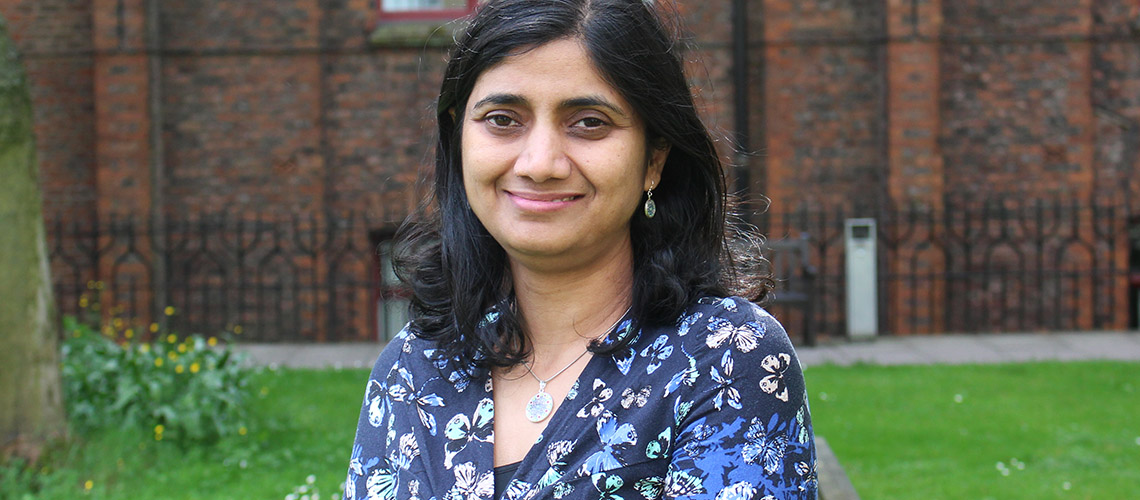Championing family friendly policies
Juggling an academic career with caring responsibilities is not an easy task. It’s something Dr Hema Radhakrishnan understands first hand and she uses her own experiences to inform her role as Associate Dean for Social Responsibility in the Faculty, where she takes a lead on equality, diversity and inclusion. She explains how getting involved with the Athena SWAN initiative has helped her and how the Faculty’s policies are changing things for the better.

I started working at the University in 2005, the same year that the Athena SWAN initiative was launched at universities across the UK to advance the careers of women in science, technology, engineering, maths and medicine in higher education and research. At the time, women weren’t necessarily progressing at the same rate as men, much more in academic situations.
I wasn’t involved with Athena SWAN at first. I didn’t think it was a big issue at all. I used to think I was invincible and would work all hours. Academics do what they do because they’re passionate about their work and that keeps you going. I finally got involved when I had my first child and I realised the trepidations of being a parent who is committed to work. Because, yes, being a parent does come first but that didn’t mean work came second for me; that has been my passion for life. It was about balancing being a woman, a mother, an academic, and a researcher so that I can give the best to all roles.
When you look at students coming in to undergraduate courses you tend to have about 50/50 male and female students, and on average they perform equally well. At postgraduate or PhD level there tends to be a slight drop off of women. But then, the progression into lecturers and senior lecturers has more of a drop. Now across the country, when you look at the average number of female professors, it is still only around 25%. As a Faculty we’ve done really well in developing policies that help both genders to progress. We have around 40% women in senior academic roles which is unusual; I’m really proud that we have achieved that.
Equality isn’t about bringing women up. It’s about equality for both genders and giving reasonable consideration to carer responsibilities; whether somebody has young children, or elderly parents, or a partner to care for. Something in your personal life shouldn’t affect your work to the point where you can’t progress. In academia you can easily be doing 50 hours a week, but someone with carer responsibilities cannot do that.
The Faculty is definitely supportive of equality; there is no doubt about it and I have seen it change over the years. What we really have done for gender equality in particular is to try to bring the focus into the quality of work that you do and milestones you’ve achieved. That is much more important than the number of hours you clock-in. Moving meetings into core hours (10am to 4pm) ensures that those who have got caring duties can be at meetings and don’t have to feel guilty for not turning up at 5pm; and that’s what empowers people to progress.
It tends to be local culture which is a barrier, like lectures in the evening, discussions that go on in the pub after work. What we’re really dealing with is how we think about it collectively. We need to remember that others have different needs and ensure we include everyone. It’s wrong to think of it as an issue just for women, it is equally for men and women.
I have young children and elderly parents and it all adds to what daily life demands of you. But the University has always been very helpful with my caregiving responsibilities. As a result I do work flexibly, some days I can start early and finish late, other days I need to work shorter hours. The biggest help that the University gives is not demanding certain hours; it’s all about the work that I do, the number of papers I publish, the grants I get, the teaching I deliver.
The world is changing and you can’t stand still at all, but there is still a long way to go to achieving equality. The biggest achievement we can hope for would be when everyone who applies for flexible working or having teaching and meetings scheduled at a time that works for them, when they feel like their request has been looked at fairly. It is the culture that needs to change. It won’t happen overnight, but we are getting there.
Discover more about Hema’s role at the University of Manchester and her involvement with Athena SWAN.
